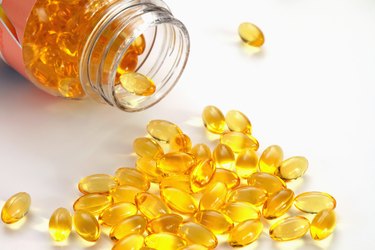
Vitamin A provides health benefits that extend beyond ensuring healthy vision. This fat-soluble vitamin plays an important role in immunity and red blood cell formation. You can get vitamin A from your diet or in vitamin A capsules for skin.
You can also find it as an ingredient in some skin care products in the form of retinol. If you are already taking vitamin A capsules for your face, you might wonder whether you can apply vitamin A directly to your skin from a pill. In theory, you can do this, but you must follow certain precautions. If you have an undiagnosed skin condition, you should consult your doctor rather than self-medicating with vitamin A tablets for skin.
Video of the Day
Video of the Day
Tip
Vitamin A capsules for skin can improve skin appearance and aid with acne control.
Improved Skin Appearance
Vitamin A has received attention for its purported ability to improve the appearance of your skin. Research has confirmed some of these claims. A study by the Center for Skin Research, published in the January 2017 issue of the Journal of Drugs in Dermatology, examined the effects of applying three different retinol-based facial products, including an exfoliating cleanser, a 0.5 percent retinol emollient cream and an SPF 30 moisturizing sunscreen.
Female subjects with mild to moderate facial photodamage used the products daily for three months. The results showed significant improvement in facial appearance after just two weeks and even more significant improvements throughout the duration of the study.
Read more: What Is Vitamin A Palmitate?
Treat Acne — With Caution
Vitamin A has a long history of use for treating acne. In some individuals, however, its use can cause side effects. Prescription retinoids, which are made from Vitamin A, can be applied topically to unblock pores and prevent the formation of blackheads and whiteheads. However, these products also may cause drying and irritation of the skin, as well as decrease the skin's natural UV protection — increasing the risk of sunburn. Protect your skin while using these products by avoiding prolonged sun exposure and wearing sunscreen daily.
In addition, note that vitamin A capsules for your face — as opposed to topical treatments — are not recommended for acne. Vitamin A tablets for skin do not have the same effects as topical retinoids and can actually cause liver damage with prolonged use.
Watch Out for Skin Changes
As with any skin care product, the risk for skin irritations exists if you apply the contents of vitamin A capsules to your face. If you experience redness or irritation, you should discontinue using vitamin A. Your risk may be greater because of the higher concentration of vitamin A in tablet form versus other commercial products.
While vitamin A provides health benefits, it can build up to toxic levels over time, especially if the recommended dosage is exceeded. Your skin will provide a barrier but may still absorb high amounts with long-term use. Finally, unless specifically stated on the product's label, topically using vitamin A tablets for skin is not an FDA-approved use.
Alternatives for Improving Skin Health
In addition to using vitamin A capsules for skin, either orally or topically, you can adjust your diet to ensure you're consuming a variety of vitamins and minerals. Foods rich in vitamins A and C are particularly beneficial for skin health. Beef, fish, liver, eggs, sweet potatoes, carrots, pumpkin, spinach and mangoes all contain Vitamin A. Foods containing Vitamin C include citrus fruits, broccoli, bell peppers, spinach, strawberries, tomatoes and Brussels sprouts.
Drinking water also promotes good skin health by flushing out bacteria and waste, regulating body temperature, aiding in the distribution of nutrients and minerals throughout the body and keeping your skin moist and hydrated. In general, aim to drink at least 2 to 3 cups of water per hour throughout the day. Up your intake even more if you're exercising and sweating, or if you're outside on a hot day. Lastly, don't forget to protect your skin with sunblock on those hot days or anytime you're spending time outdoors.
- Linus Pauling Institute: "Vitamin A"
- Journal of Drugs in Dermatology: "Open-Label Study Evaluating the Anti-Aging Effects of a 3-Product, 2-Step Retinol-Rejuvenation System Following 3 Months of Treatment in Subjects With Photodamage"
- University of Michigan University Health Service: "Acne"
- National Center for Biotechnology Information: "Vitamin A Toxicity"
- Harvard Health Publishing: "The Best Foods for Vitamins and Minerals"
- Harvard Health Publishing: "How Much Water Should You Drink?"